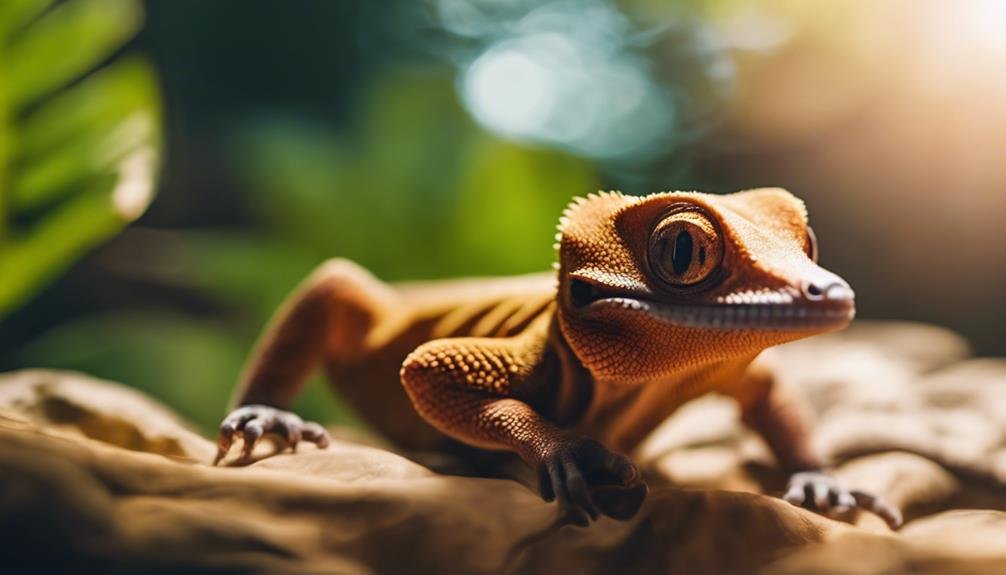If you’re considering whether your crested gecko needs UVB lighting, it’s important to understand the balance between natural light and UV exposure. While these nocturnal creatures don’t bask in the sun like other reptiles, a controlled amount of UVB plays a vital role in their health, aiding in vitamin D3 synthesis for calcium absorption. However, the question remains: how much is beneficial without causing harm? Setting up the right environment requires a nuanced approach, ensuring they receive the benefits of UVB without stress. Join the conversation to explore how to mimic their natural habitat for optimal health and well-being.
Key Takeaways
- Crested geckos benefit from low levels of UVB (2-5%) for Vitamin D3 synthesis and calcium absorption.
- While not strictly necessary, UVB lighting mimics natural sunlight, promoting healthier growth and preventing metabolic bone disease.
- As crepuscular animals, crested geckos thrive in low light, suggesting that intense UVB or sunlight is not required.
- Implementing a balanced light cycle with UVB exposure during the day and complete darkness at night aligns with their natural behaviors.
- Proper UVB lighting enhances natural behaviors, supporting immune function and overall health in crested geckos.
Understanding UVB Lighting
UVB lighting plays an important role in your crested gecko’s health by aiding in Vitamin D3 synthesis, which is essential for calcium absorption and preventing metabolic bone disease. It’s vital to understand that while your gecko thrives in a controlled environment, replicating the benefits of natural sunlight through proper lighting can greatly impact their well-being. Low levels of UVB exposure, around 2-5%, are beneficial, mimicking the subtle but vital exposure they’d receive in the wild.
Integrating UVB lighting into your gecko’s habitat isn’t just about providing light; it’s about creating a balanced light cycle that supports their physiological processes. This means establishing a gradient within the enclosure, ensuring there are areas of lower and higher intensity. This gradient allows your gecko to self-regulate their exposure, avoiding overexposure, which can be as harmful as a deficiency.
Monitoring and maintaining this setup requires attention but is straightforward. Ensuring your gecko receives the right amount of UVB light is key to promoting their overall health and ensuring they lead a long, happy life in captivity. Remember, proper lighting isn’t just about visibility; it’s about creating an environment that closely mirrors their natural habitat, supporting essential health benefits.
Crested Gecko Natural Behaviors
Understanding the significance of UVB lighting for your crested gecko’s health, it’s also important to explore their natural behaviors to fully cater to their needs. Crested geckos, being crepuscular, thrive in the low light conditions of dusk and dawn, when they exhibit their most active behaviors such as climbing, hunting, and exploring. Unlike nocturnal lizards that are active throughout the night, your crested gecko prefers the subdued light of twilight to engage in its daily activities.
During the day, these geckos seek refuge and hide to avoid direct sunlight, indicating their natural inclination towards dimmer environments. This behavior underscores the importance of mimicking their natural habitat by providing a gradient of light and darkness within their enclosure. It’s not just about the presence of UVB light but understanding the balance of natural light that aligns with their crepuscular nature.
Their specialized skin adaptations play an important role in how they regulate exposure to light and UV, allowing them to thrive in environments that closely resemble their natural habitat. Observing these behaviors in conditions that emulate the low light of dusk and dawn can offer invaluable insights into their preferences and needs, ensuring their well-being in captivity.
Benefits of UVB for Reptiles
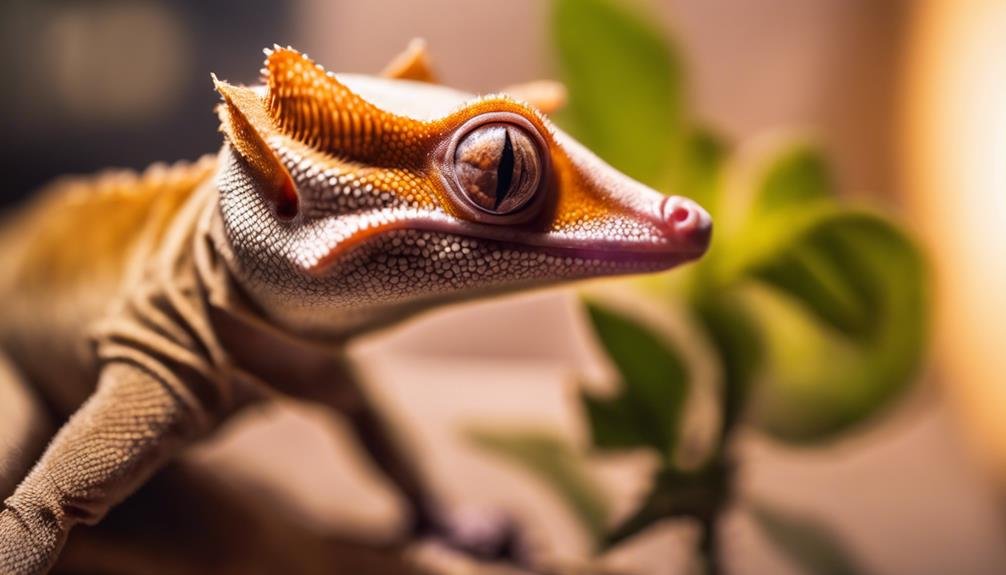

You’ve seen how UVB light is essential for your crested gecko’s health, from supporting Vitamin D3 synthesis for strong bones to enhancing their natural behaviors.
It doesn’t just stop there; UVB exposure is key in promoting healthy growth and ensuring your pet’s metabolism and immune system are functioning at their best.
Let’s explore how UVB influences Vitamin D3 synthesis, encourages proper development, and plays a role in your gecko’s ability to behave as they’d in the wild.
UVB and Vitamin D3
For Crested Geckos, obtaining enough UVB light is essential as it plays a key role in Vitamin D3 synthesis, necessary for their ability to absorb calcium and avoid serious health issues. UVB exposure isn’t just important; it’s pivotal for mimicking natural sunlight, which promotes their overall health and well-being. Without it, they’re at risk of nutritional deficiencies and issues related to inadequate Vitamin D3 levels. Proper reptile lighting ensures they regulate their calcium levels effectively, supporting strong bones and physiological functions. Here’s a quick glance at why UVB and Vitamin D3 are fundamental:
| Aspect | Importance | Outcome |
|---|---|---|
| UVB Exposure | Synthesizes Vitamin D3 | Aids Calcium Absorption |
| Calcium Absorption | Prevents Metabolic Bone Disease | Ensures Strong Bones |
| Reptile Lighting | Mimics Natural Sunlight | Promotes Overall Health |
Promoting Healthy Growth
Now that we’ve explored how UVB light is essential for Vitamin D3 synthesis and preventing metabolic bone disease, let’s look at its role in promoting healthy growth in crested geckos.
By providing a UVB bulb in your gecko’s habitat, you’re not just mimicking natural sunlight; you’re ensuring their bodies can efficiently undergo Vitamin D3 synthesis. This process is important for calcium absorption, a key factor in developing strong bones and preventing metabolic bone disease.
Without adequate UVB exposure, crested geckos may struggle to regulate calcium levels properly, leading to stunted growth and other health issues. Therefore, incorporating UVB lighting is essential for their overall health, supporting proper bone development and metabolic functions, ensuring your crested gecko grows up healthy and strong.
Enhancing Natural Behaviors
Exposing your crested gecko to UVB light enhances their natural behaviors, closely mirroring the sunlight conditions of their wild habitat. This UVB exposure isn’t just about simulating their environment; it’s essential for their daily activities. Your gecko will regulate its feeding, breeding, and basking more naturally, aligning with their instincts. Additionally, UVB light supports healthier circadian rhythms, ensuring your gecko’s internal clock ticks as it should, promoting overall well-being.
But it’s not just about behaviors. UVB plays an important role in their physical health too. It aids in proper metabolism, digestion, and critically, calcium absorption. This means stronger bones and a healthier gecko. By providing UVB light, you’re not just mimicking natural light; you’re stimulating your gecko’s natural instincts, contributing significantly to both their physical and mental health.
Nighttime Lighting Needs
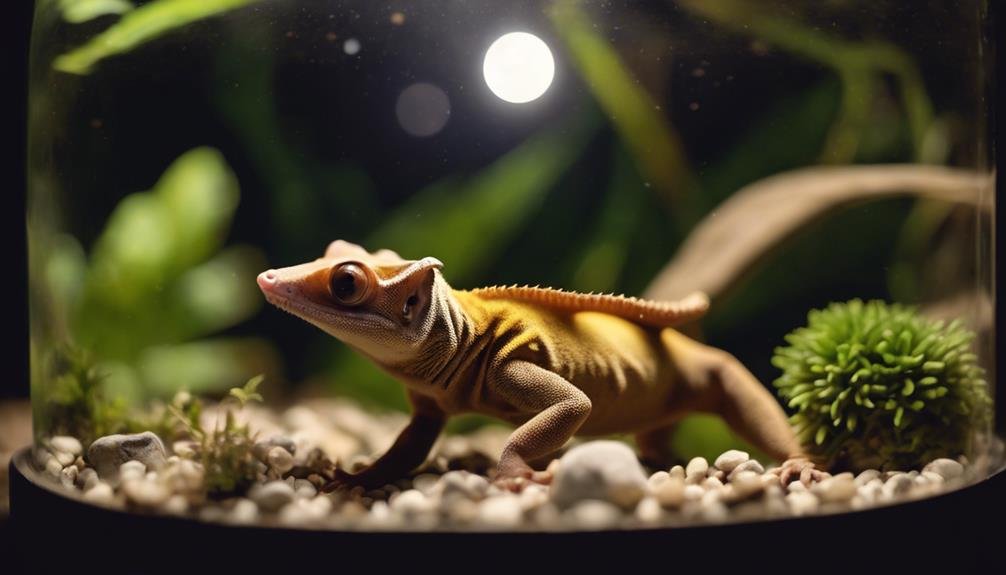

When pondering the nighttime needs for your Crested Gecko, it’s crucial to understand how night light can impact their sleep cycle.
You don’t need to worry about additional lighting at night, as these geckos are naturally active in dim conditions and need their rest too.
Let’s explore the importance of maintaining the right temperature and how it supports their nocturnal lifestyle.
Night Light Impact
Understanding the impact of nighttime lighting on crested geckos is essential, as they don’t need night lights and thrive in complete darkness. Introducing a night light can disrupt their natural light cycle, which is necessary for their health and well-being. Here’s why sticking to natural light patterns benefits your gecko:
- Night lights can interfere with the gecko’s natural behavior, causing stress and affecting their health.
- A proper light cycle without artificial night lighting supports their thermoregulation and rest.
- Complete darkness at night aligns with their crepuscular activity, promoting a healthy lifestyle.
Ensuring your crested gecko experiences the darkness after sunset plays an important role in maintaining their natural rhythm and contributes to their overall health.
Sleep Cycle Considerations
After discussing the negative impacts of night lights, it’s important to focus on the sleep cycle needs of crested geckos, particularly regarding nighttime lighting. These reptiles thrive under natural light cycles, with minimal need for artificial nighttime lighting. As crepuscular creatures, they’re active in dim light, making it essential to mimic their natural habitat for best health.
Ensuring a safe drop in temperature at night, into the mid-60s, supports their well-being without the need for a continuous heat source. If temperatures dip below the 60s, consider using ceramic heat emitters or space heaters with thermostats for temperature control. This approach maintains a consistent environment, prioritizing their natural behaviors and physiological needs over unnecessary nighttime lighting.
UVB and Plant Growth
UVB bulbs play an essential role in enhancing plant growth within bioactive crested gecko enclosures by mimicking the benefits of natural sunlight. When you’re setting up your crested gecko’s home, incorporating UVB lighting isn’t just about your pet’s health; it’s also important for the plants sharing their space. These bulbs support the photosynthesis process, necessary for plant survival and health. By simulating the natural sunlight conditions, UVB lighting encourages plants to thrive, contributing to a balanced and vibrant ecosystem within the enclosure.
Here’s how UVB lighting benefits plant growth in bioactive enclosures:
- Supports Photosynthesis: UVB light aids in the photosynthesis process, enabling plants to convert light into the energy needed for growth and development.
- Mimics Natural Sunlight: By simulating natural sunlight, UVB bulbs encourage healthier and more robust plant growth.
- Contributes to a Healthy Ecosystem: Adequate UVB levels help maintain a flourishing plant environment, which, in turn, supports the overall health of your crested gecko’s habitat.
Incorporating UVB lighting into your crested gecko’s bioactive enclosure isn’t just a choice—it’s a necessity for a thriving plant and gecko life.
Setting Up the Enclosure
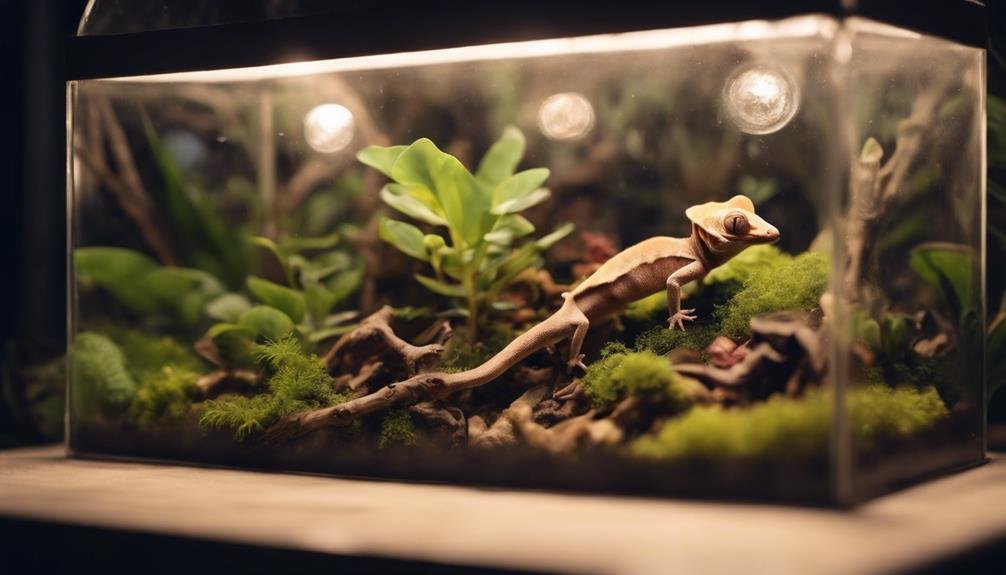

Now that you’re familiar with how UVB lighting benefits plant growth in your crested gecko’s bioactive enclosure, let’s focus on how to properly set up the enclosure to guarantee your pet thrives under these conditions.
First off, you’ll need to provide a UVB bulb with a low percentage, ideally between 2-5%, to closely mimic the natural light exposure crested geckos would experience in the wild. This setup helps make sure they receive the right amount of UVB without overexposure.
Positioning the UVB bulb on top of the enclosure is important, and it’s best to have mesh covering this area. This setup allows the light to penetrate the enclosure effectively while ensuring your gecko gets adequate exposure without direct contact.
Implementing a consistent 12-hour light cycle, such as from 8 am to 8 pm, helps regulate the UVB exposure, supporting your crested gecko’s health and well-being. It’s important to avoid exposing your gecko to UVB light during nighttime, as this could disrupt their natural light cycle, potentially impacting their health.
Properly managing the UVB bulb’s position and exposure time is key to offering the best benefits for your crested gecko’s enclosure.
Choosing the Right Lights
Selecting the ideal UVB lighting for your crested gecko’s habitat involves considering bulb intensity and placement to guarantee their health and comfort. Opting for low percentage UVB bulbs, specifically between 2-5%, meets their needs without overexposure. Fluorescent bulbs are often recommended for their efficiency and suitability in providing the necessary UV light without emitting excessive heat.
When setting up the light, it’s essential to:
- Ensure the correct distance between the UVB source and your gecko. Too close can be harmful, while too far might render it ineffective.
- Mimic natural light cycles with a 12-hour light cycle to support your gecko’s circadian rhythm, turning the light off at night to replicate their natural crepuscular activity.
- Avoid nighttime exposure to UVB light, as crested geckos are active during dawn and dusk when natural UV levels are lower.
Consulting with experienced gecko owners or professionals will provide valuable insights into the best practices for UVB light setup, ensuring your crested gecko thrives in its environment. Remember, the right balance of UV light, distance, and light cycle is key to maintaining their health and well-being.
Monitoring and Adjustments
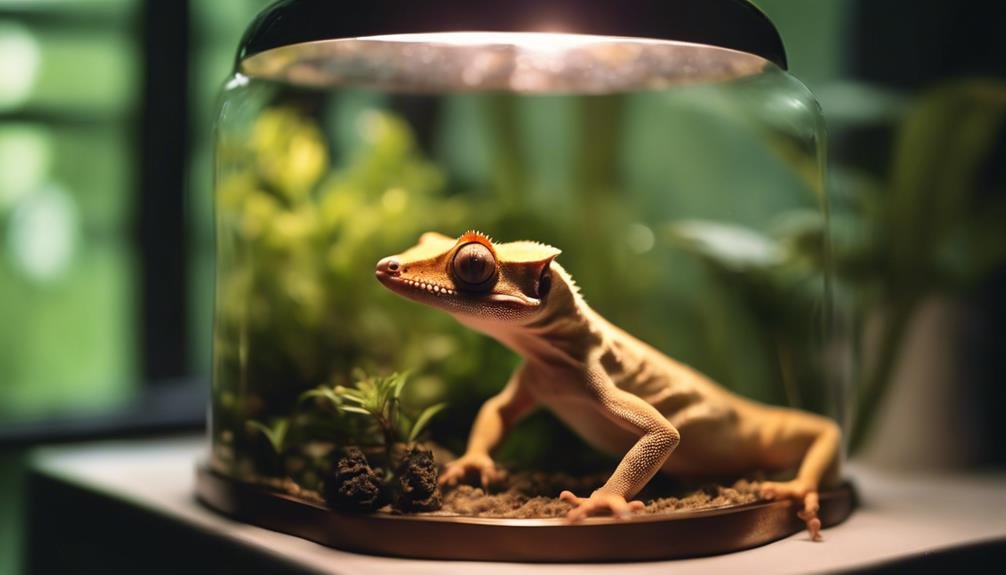

After setting up the ideal UVB lighting for your crested gecko, it’s important to monitor how they react to guarantee their comfort and safety. Keeping an eye on their behavior will tell you a lot about whether they’re thriving under the new conditions or if something needs to change. If you notice your gecko avoiding the light or showing signs of stress, it’s a clear signal that adjustments are necessary.
Adjusting the distance and duration of UVB exposure is vital based on your gecko’s response. They should have the opportunity to bask in the light but also retreat to shaded areas if they prefer. Watching for any signs of overexposure, such as discomfort or changes in skin condition, is also important. If these signs appear, it’s time to dial back the intensity or duration of the light.
Regular assessments of your gecko’s overall health and behavior will guide you in fine-tuning the UVB setup. And remember, there’s no shame in seeking advice from experienced keepers or herpetologists. They can offer valuable insights into monitoring and making the right adjustments to ensure your crested gecko benefits fully from its UVB exposure.
Does the need for natural light affect a crested gecko’s behavior and biting tendencies?
Crested gecko teeth and bites are crucial to their behavior and well-being. Natural light helps regulate their circadian rhythm and supports their overall health. Without proper lighting, they may become stressed or irritable, leading to biting tendencies. Providing adequate natural light can positively impact a crested gecko’s behavior and reduce the likelihood of biting.
Frequently Asked Questions
Do Crested Geckos Need UVB or Uva?
You’re wondering if your crested gecko needs UVB or UVA light. They thrive with UVB for vitamin synthesis, essential for their skin health and overall well-being. Unlike UVA, UVB helps in calcium absorption, preventing metabolic bone disease.
Considering their night activity, direct sunlight isn’t necessary, but a bit of UVB mimics their natural habitat. They prefer shade but benefit from occasional UVB exposure to stay healthy.
What Lighting Is Best for Crested Geckos?
For your crested gecko, the best lighting mimics a natural day-night cycle, essential for their well-being. LED options are great for achieving this without emitting too much heat. However, you’ll still need a separate heat lamp to maintain the right temperature.
Installing dimming controls can help simulate sunrise and sunset, providing a more natural environment. Remember, the key is balancing these elements to make sure your gecko thrives in a comfortable, healthy habitat.
Is 7% UVB Too Much for Crested Gecko?
Yes, 7% UVB is likely too much for your crested gecko. They thrive with lower UVB levels, around 2-5%, to avoid health issues like skin burns.
You’ll want to monitor their behavior and skin shedding closely for signs of stress or discomfort. Also, make sure the humidity levels and temperature control are ideal for their environment.
If you’re unsure, it’s wise to consult with a reptile expert or vet for advice.
Is UVA or UVB More Important for Reptiles?
For reptiles, both UVA and UVB play key roles, but UVB is essential for vitamin D3 synthesis, necessary for their skin health and calcium absorption. Without enough UVB, they can’t properly process calcium, leading to serious health issues.
UVA impacts their behavior and immune system, but the lack of UVB can cause more critical problems, like metabolic bone disease. So, while both are important, UVB is essential for their overall health.
Conclusion
To sum up, you’ve learned that crested geckos can thrive with the right UVB lighting, mimicking their natural habitat. By understanding their behaviors and the benefits of UVB, you’re equipped to create a healthy environment.
Remember, nighttime needs differ, and UVB also benefits plant growth in their enclosure. Choose the right lights, set up the enclosure thoughtfully, and keep a close eye for any necessary adjustments.
Your crested gecko’s well-being depends on the balance you strike in their day-to-day life.

